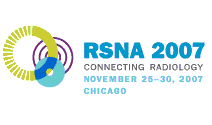
Abstract Archives of the RSNA, 2007
Abdelmonem Mohamed Mourad PhD, Presenter: Nothing to Disclose
Reem Adly Ashry MD, Abstract Co-Author: Nothing to Disclose
Mark E. Schweitzer MD, Abstract Co-Author: Nothing to Disclose
Lynne Patricia Pinkney MD, Abstract Co-Author: Nothing to Disclose
MR imaging of the hip is becoming more commonly performed. Subsequent to this, what have been previously considered rare diagnoses are increasingly recognized. Ligamentum teres syndrome (LTS) is a clinical disorder manifested by apparent thickening of the ligamentum teres usually secondary to synovial proliferation. We describe the MR findings of this rare disorder and evaluate the accuracy of several MR signs.
112 patients were studied, 12 with LTS and 100 without at 1.5T with proton density, T1 and fluid weighted images were done. Compared on a 1-5 confidence scale were evaluated; 1) labral tears; 2) presence of joint effusion; 3) subjacent cartilage loss; 4) subjacent marrow edema; 5) loss of fat in either A) fossa acetabuli, B) fovea capitis; as well as the 6) size of the ligamentum teres 7) age, gender; and 8) presenting symptoms. Sensitivity, specificity, accuracy as well as ROC curves were developed
Labral tears, joint effusions, subjacent marrow edema and cartilage loss were similar in the two populations (P > .05). However loss of acetabular fat (P=4.8mm. The sensitivity/specificity for the loss of fossa acetabuli fat was 75%/86% when it was <=3 and for the loss of fovea capitis fat was 83.33%/99% when it was <=1.
The criteria for a thickened ligamentum teres is 13X5mm. The loss of fat in the fossa acetabuli or fovea capitis are extremely helpful secondary signs for LTS; while labral tears, marrow edema, joint fluid and cartilage loss are no discriminatory signs of the disorder.
Ligamentum teres larger than 13X5mm with loss of either fovea capitis or fossa acetabuli fat pad is consistent with ligmaentum teres syndrome
Mourad, A,
Ashry, R,
Schweitzer, M,
Pinkney, L,
MR of the Ligamentum Teres Syndrome. Radiological Society of North America 2007 Scientific Assembly and Annual Meeting, November 25 - November 30, 2007 ,Chicago IL.
http://archive.rsna.org/2007/5011692.html

